By Lindsay M. Miller and Rebecca Trout
The theme of the All-America City Awards for 2019, our 70th Anniversary, was “Creating Healthy Communities through Inclusive Civic Engagement.” This focus on health at the local level is predicated on the belief that, while the nation may be stagnating in national discourse around health and healthcare, at the local level we have been and will continue to be working together to collectively address issues like improving health and health equity.
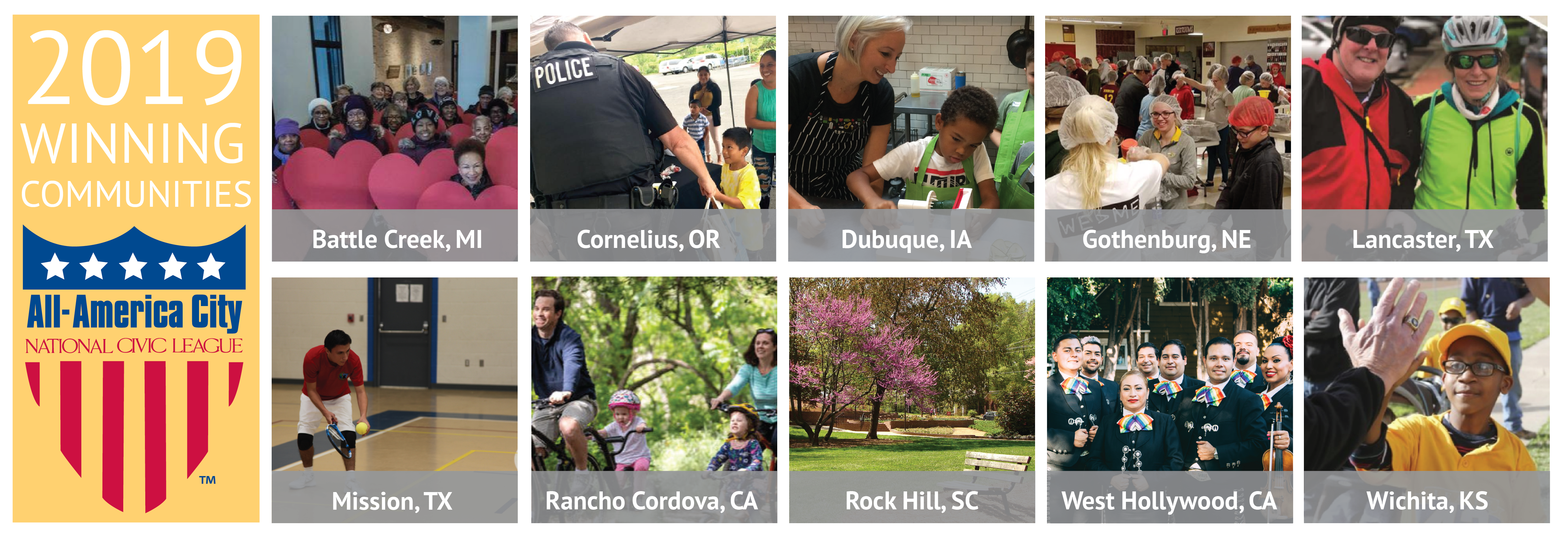 What’s more, the 2019 All-America Cities have demonstrated that healthcare does not always have to mean “sick care,” and that we need not get so bogged down in statistics that we forget that healthcare is an issue with a face.
What’s more, the 2019 All-America Cities have demonstrated that healthcare does not always have to mean “sick care,” and that we need not get so bogged down in statistics that we forget that healthcare is an issue with a face.
While all the community projects and programs submitted to the All-America City Awards were inspiring, the projects described below demonstrate an exceptional commitment to addressing health and health-related concerns at the local level through inclusive civic engagement. This means that residents, especially historically under-represented groups, were involved with the ideation, implementation, and/or outcomes of health-related programs.
Projects from this year’s winners include exceptional attention to the following areas: mental and behavioral health; increasing access to healthy foods, improving the physical and built environment; making self-care fun through competitions and community programs; and establishing partnerships to creatively and collaboratively address health disparities.
Behavioral Health
Two cities showed exceptional attention to behavioral health: Battle Creek, Michigan, and Dubuque, Iowa. In both towns, the numbers of encounters between people with mental illnesses and police officers were increasing. Often times, police officers are the first on the scene of a mental health crisis, and Dubuque and Battle Creek recognized that this might not be the most effective way to address these problems.
In Battle Creek, the police department and Summit Pointe, a local mental illness and behavioral healthcare provider, collaborated to create the Crisis Intervention Team (CIT), a community partnership of law enforcement, mental health and addiction professionals, local hospital professionals, the prosecutor’s office, and community members who live with mental illness and/or addiction disorders, their families, and advocates.
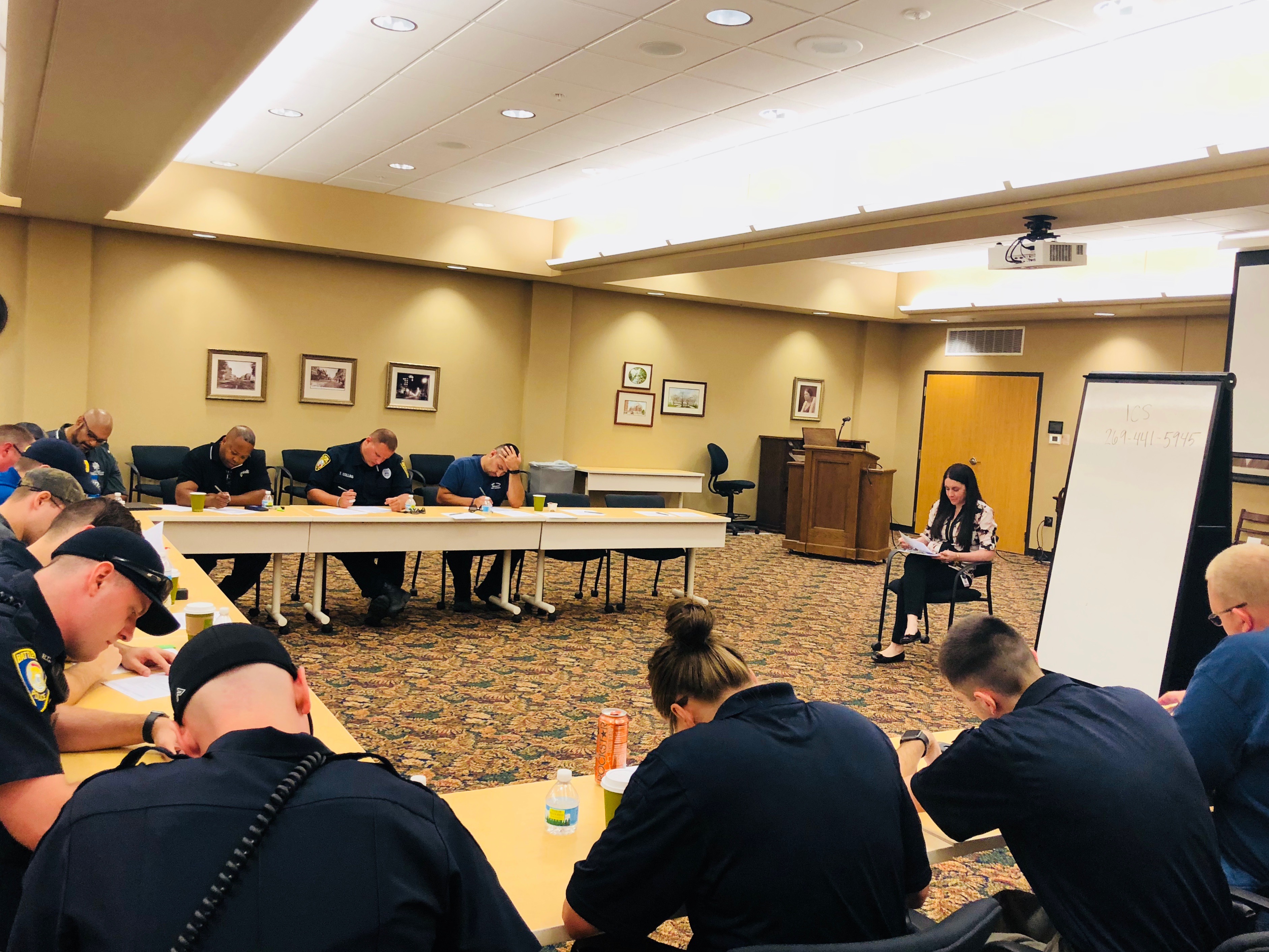 During CIT training, officers learned the common signs of mental illness recognized when those signs represent a crisis and how to safely de-escalate individuals experiencing behavioral health crises by utilizing community resources and diversion strategies. Behavioral staff had ride-along shifts with officers and officers had home visits with case managers to encourage understanding and collaboration between the two groups. Since its beginning, the CIT program has had 366 CIT interventions; 60 of those individuals could have been arrested, yet all but six were diverted to local mental health services; 161 individuals were voluntarily transported to the hospital for a mental health evaluation; and 39 incidents were resolved on the scene.
During CIT training, officers learned the common signs of mental illness recognized when those signs represent a crisis and how to safely de-escalate individuals experiencing behavioral health crises by utilizing community resources and diversion strategies. Behavioral staff had ride-along shifts with officers and officers had home visits with case managers to encourage understanding and collaboration between the two groups. Since its beginning, the CIT program has had 366 CIT interventions; 60 of those individuals could have been arrested, yet all but six were diverted to local mental health services; 161 individuals were voluntarily transported to the hospital for a mental health evaluation; and 39 incidents were resolved on the scene.
In Dubuque, police requested assistance with responding to mental health crisis incidents. A stakeholder group developed a mobile crisis unit which provides a much better resolution for individuals in mental health crisis, as well as officers.
Additionally, the Brain Health Task Force in Dubuque provides education to providers to increase community awareness of brain health and the group is working to establish an access center in Dubuque for individuals with urgent mental health needs. Lastly, the program identified issues impacting jail inmates with acute brain health behaviors such as inmates staying in jail too long, jeopardizing Medicaid status, and inmates released into the community without support.
Access to Healthy Foods
Many of this year’s All-America Cities recognized that access to healthy foods was a primary concern in their cities and towns. Many cities were considered “food deserts,” where fresh and healthy food was hard to come by. Cities like Rancho Cordova, California and Wichita, Kansas, have implemented programs to increase access to healthy foods, particularly among children and low-income populations where access is lowest and preventable and diet-related illness is high.
Recognizing that many residents in urban Rancho Cordova lacked access to healthy food, Soil Born Farms stepped-in to turn urban residents into farmers, teach good nutrition, and creatively leverage community resources.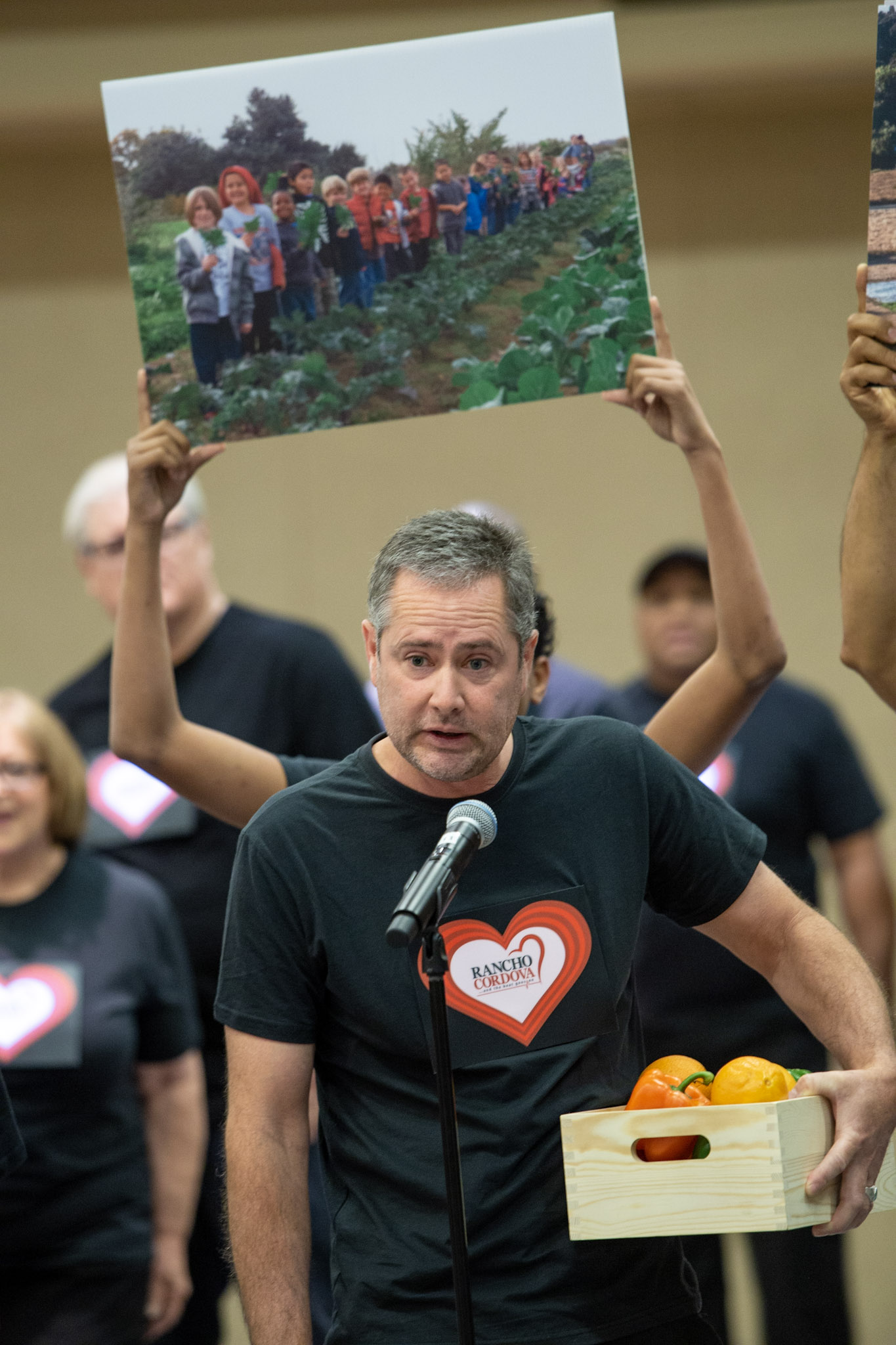
Soil Born Farms is a 55-acre historic community farm located in Rancho Cordova. This rare community asset provides a wonderfully diverse landscape which engages both youth and adults in hands-on activities that connect them to the natural world, healthy food, healthy eating, job and life skills, hard work, and service opportunities.
Vegetables from Soil Born fields get to consumers through local markets and restaurants, local food banks and the American River Ranch Farmstand. At the Ranch and other community sites, Soil Born runs programs that focus on promoting good health and providing learning opportunities for youth and adults to produce healthy food for themselves and for others.
Outcomes to date include:
- 59 beginning farmers trained;
- 1,795 adults attended gardening, cooking and herbal care classes;
- 2,557 students engaged in school gardens at 10 campuses; and
- 386,060 pounds of fruit donated to families in need; and
As in Rancho Cordova, many Wichita residents lack access to healthy foods. To address this need, the city commissioned the Hurdles to Healthy Food Access assessment which explored the barriers to healthy food consumption. The study included community engagement and key informant interviews with residents of specific zip codes, chosen for their comparatively low median income levels and lack of availability of healthy and affordable food sources. The study identified six common factors of living in a low-healthy-food-access area.
To address the factors identified in the study, the Health and Wellness Coalition of Wichita established a Food Policy Committee to engage the community in addressing food equity issues, advocate for policies that increase access to healthy foods, host community events, and develop programs to encourage healthy eating. One focus of the committee has been partnering with schools to provide breakfast to students who may not otherwise have access to it. 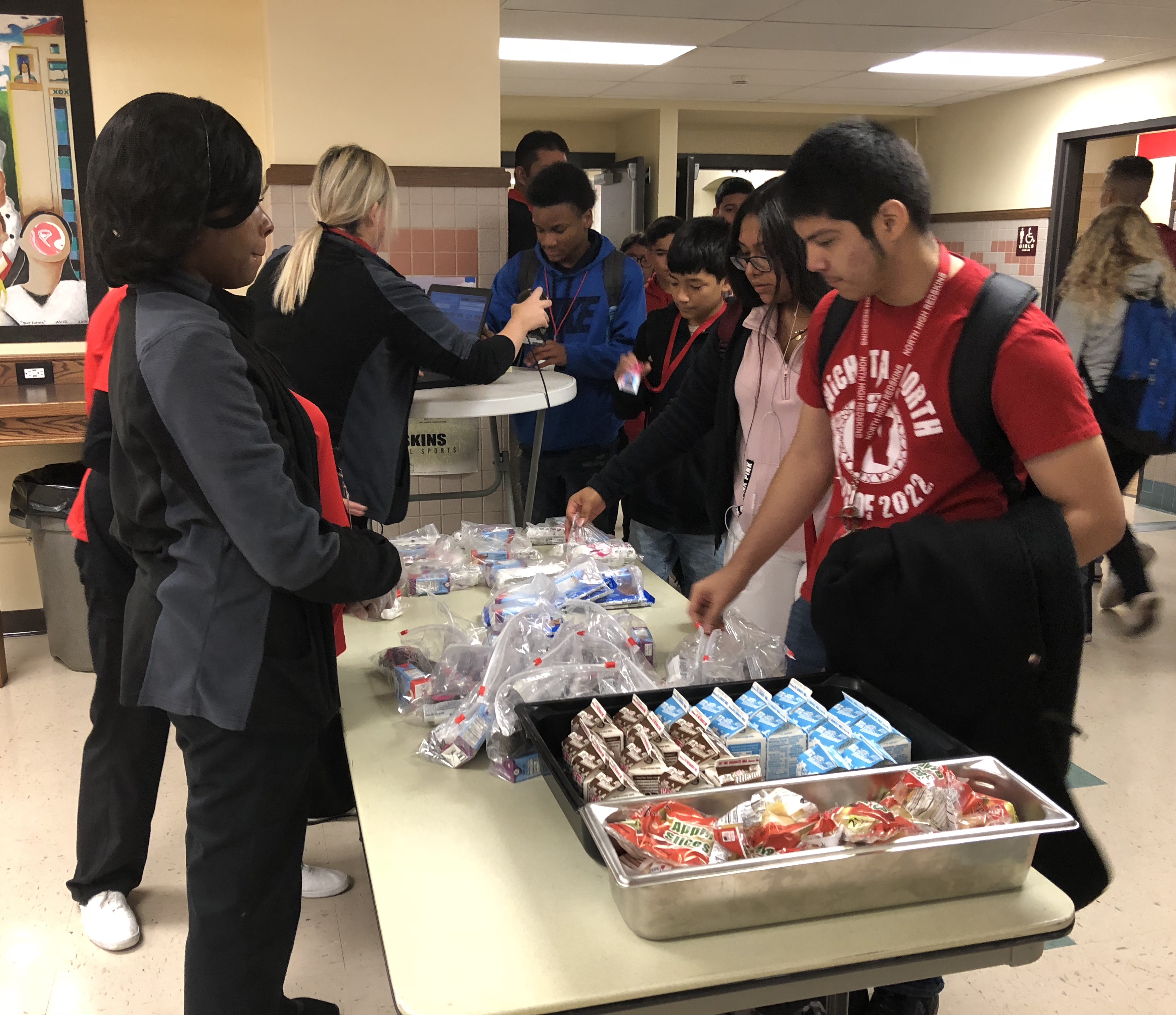
Since the committee’s work began, schools have expanded breakfast offerings to include extended serving times in cafeterias, grab-and-go breakfasts from carts or kiosks, and “second-chance breakfast” in which students are offered breakfast after homeroom or first period. The school district is now serving about 1,100 more breakfasts each day–a 45 percent increase. The Food Policy Committee is also collaborating with residents, community partners, and experts to develop a Master Food Plan that will provide guidance on food policy issues.
Improving the Built Environment
Improving the built environment was another concern among All-America Cities, including Cornelius, Oregon and Gothenburg, Nebraska. Understanding that housing and education are key determinants of health, the City of Cornelius worked with a committee of dedicated volunteers and community partners to build a new library, which also offers affordable senior housing.
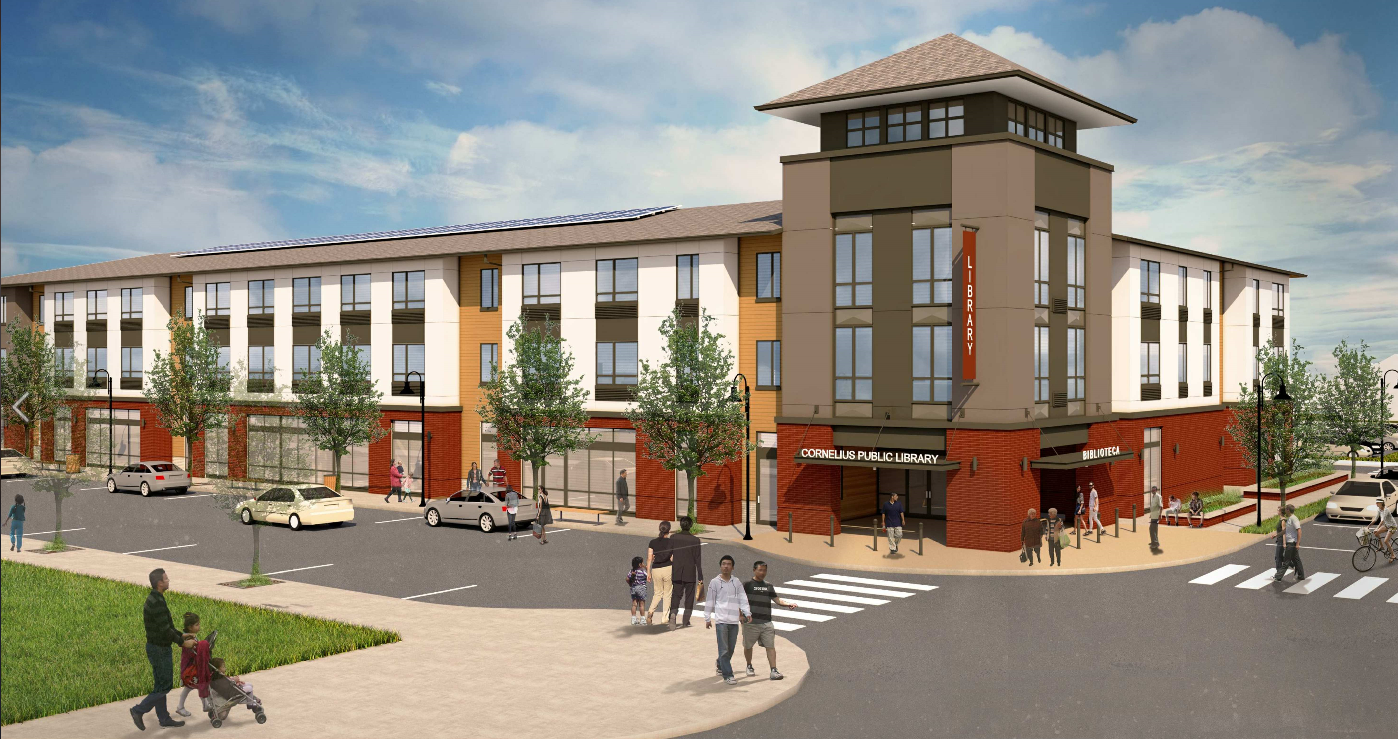 The newly constructed building, Cornelius Place, now houses a library and learning center on the first floor and affordable senior housing on the second and third floors. The new library is ideally located in the town center, on a bus line and within walking distance of almost all residents. To increase inclusiveness and equity, the library recruits bilingual and Latino volunteers and staff.
The newly constructed building, Cornelius Place, now houses a library and learning center on the first floor and affordable senior housing on the second and third floors. The new library is ideally located in the town center, on a bus line and within walking distance of almost all residents. To increase inclusiveness and equity, the library recruits bilingual and Latino volunteers and staff.
In Gothenburg, through a series of ten community focus groups, the local hospital identified an overwhelming need for expanded wellness and recreation opportunities. A financial feasibility study then concluded that a stand-alone recreation center would cost between $8 million and $12 million, while building alongside the ongoing hospital expansion would allow the recreation center to be built for only $5 million. The community quickly came together to raise money for the construction; $3.3 million was raised by individuals and local businesses while the remaining $1.8 million came from successful grant requests.
After fundraising goals were met, a partnership with the YMCA of the Prairie was formed to include 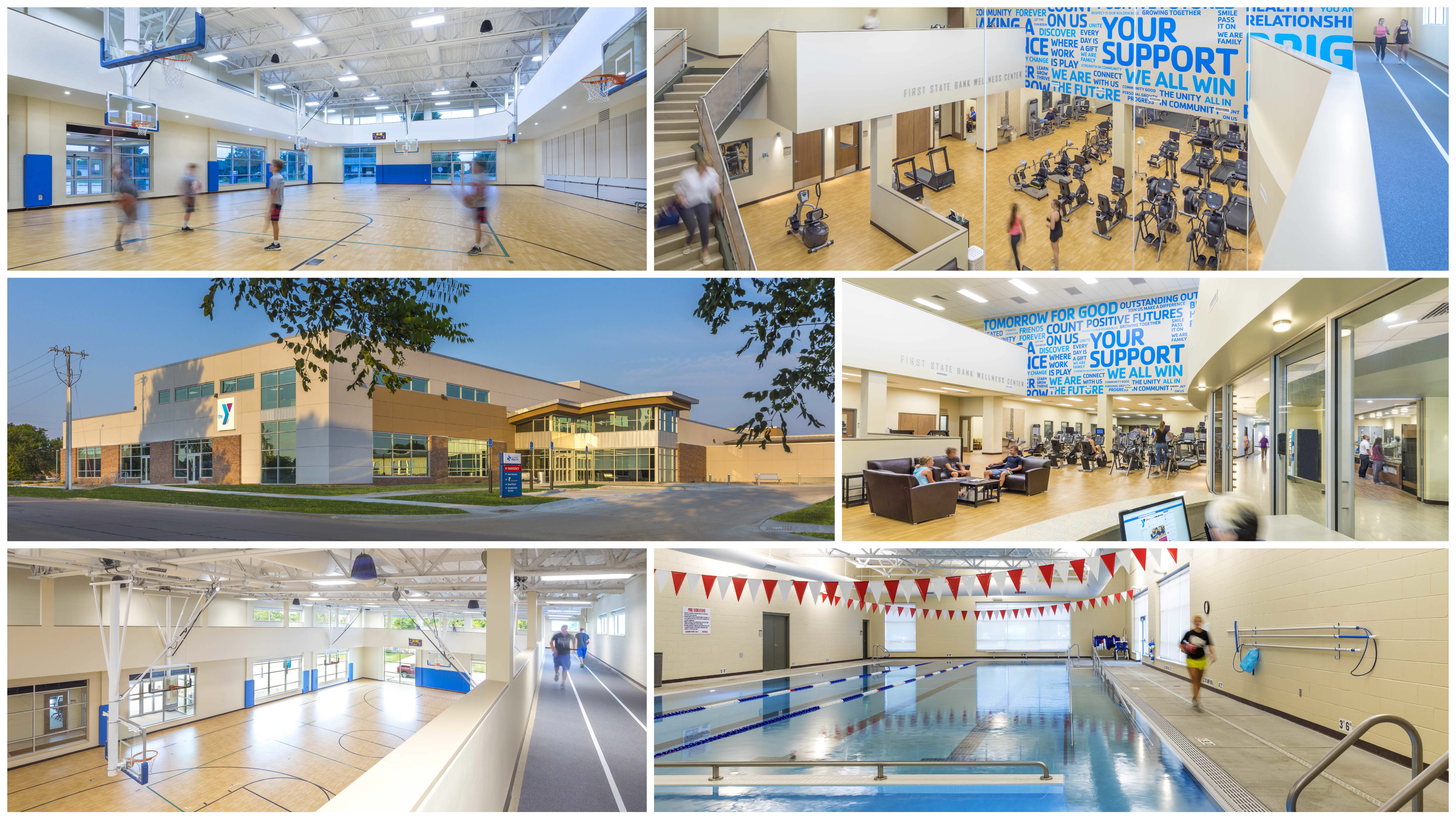 Gothenburg into their association. This partnership helped ensure that the project was far more than just a new building, as the YMCA has the resources to holistically address community needs.
Gothenburg into their association. This partnership helped ensure that the project was far more than just a new building, as the YMCA has the resources to holistically address community needs.
The facility opened in April of 2018 and includes a lap pool, a gymnasium, walking track, and fitness room. The building also contains space for the education of healthier lifestyles, dietary consultation, and programming for all age
Making Health Fun
Health and healthcare can often be stressful topics, invoking images of stressful dieting and tedious exercise. Yet some cities have found a way to make exercising, eating better, and adopting healthier habits fun, sometimes inciting some friendly competition. Lancaster, Texas, participated in the It’s Time Texas Community Challenge, an 8-week competition that mobilizes schools, businesses, organizations, community members, and mayors toward the common goal of transforming a community’s health.
The city also formed a Mayor’s Health and Fitness Council that includes Parks and Recreation staff, Lancaster Police Department staff, Lancaster Fire and Medical staff, library staff, community relations staff, Cedar Valley College, Anytime Fitness, Crescent Medical Center, and other corporate partners. Some health programs the council has initiated are a “Couch to 5k” run/walk, community health fair, a basketball game challenge, smoke free city-wide ordinance, “Stork’s Nest,” program that encourages low-income mothers to seek pre-natal care, and “Convoy of Hope,” an event that included health and dental screenings, patient education, a mobile asthma clinic, as well as STD screenings and preventative education.
Rock Hill, South Carolina found a way to make getting healthier fun for residents who might otherwise be left out. The Rock Hill Parks, Recreation, and Tourism (PRT) Department provides children and adults who are disabled with opportunities to participate in activities including: Bocce, Cooking Classes, Disc Golf, Kayaking, etc. The city’s strategic goals also include providing at least two cycling events for special populations, and PRT spearheads a mainstreamed summer camp for those with intellectual disabilities.
Though proud of this work, the community felt that there needed to be a physical space dedicated to special populations. The city was approached by residents and representatives from Max Abilities—formerly York County Board of Disabilities and Special Needs – about a miracle field, which is a baseball field designed for people with special needs.
Through the course of engagement efforts with families, recipients of services through Max Abilities, and those who support their work, the miracle field has become a full miracle park for those with special needs.
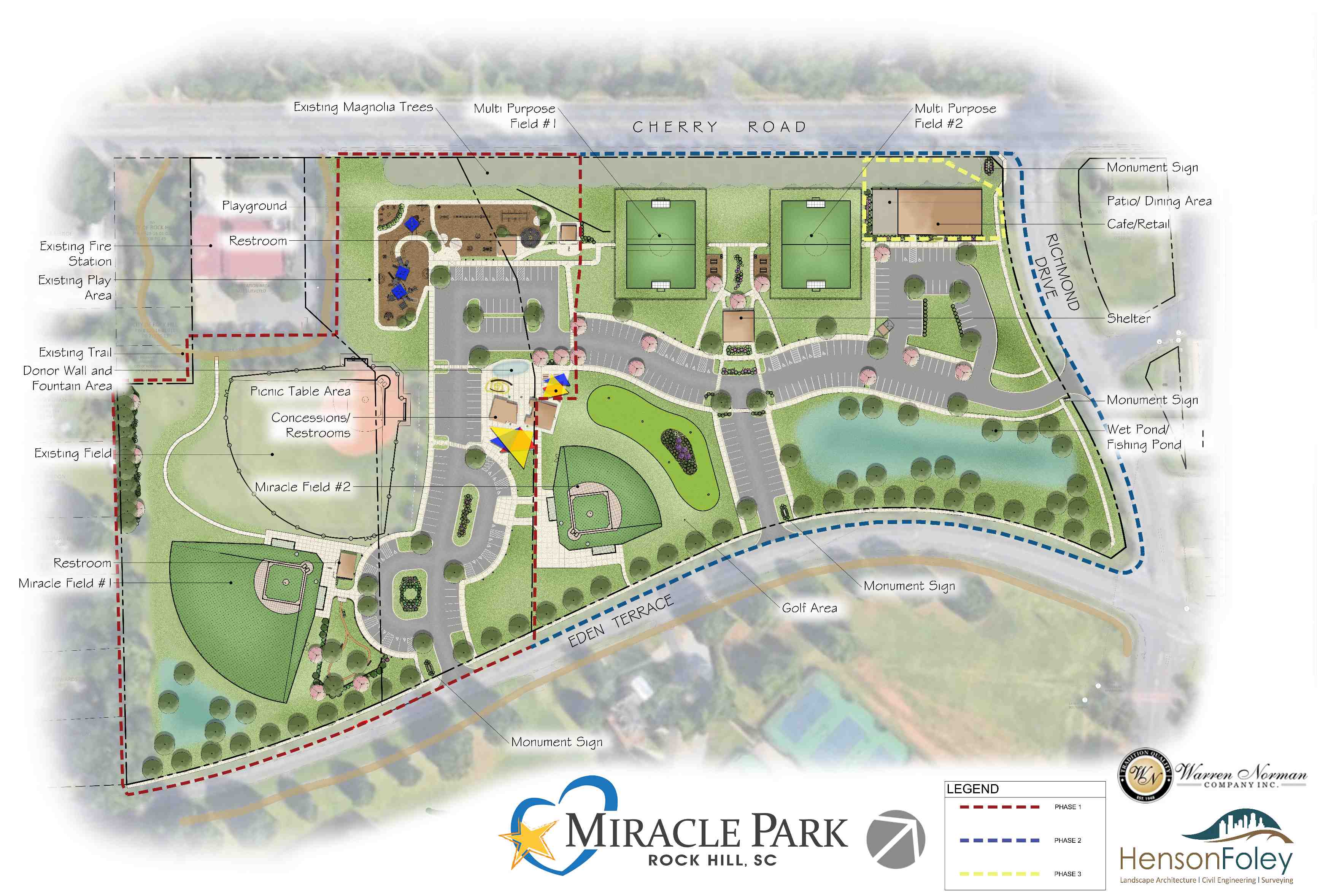
Groundbreaking for Miracle Park is scheduled to begin in March 2019. When fully built out, this 15-acre park will include two miracle baseball fields, two multi-purpose fields, playground, walking trails, shelters, golf area, fishing pond, and a café/retail component to provide employment opportunities for these special needs individuals.
Addressing Health Disparities through Collaboration
Some finalist cities formed collaborations to address health disparities and solve problems. In West Hollywood, California, collaboration is essential when combating its high rate of homelessness. LGBT youth and adults come to West Hollywood seeking safety and self-determination, but sometimes they lack adequate support networks and end up without housing. In addition, West Hollywood has a significant population of older adults living below the poverty line who are at risk of homelessness.
The West Hollywood Homeless Initiative was created to address these issues. This collaborative effort is led by city staff members, nonprofit social service providers, law enforcement, and Los Angeles County agencies.
Some activities of the Homeless Initiative have included:
- Training of officers to address the impacts of homelessness.
- Social services such as outreach, substance abuse treatment, mental health programming and housing for homeless individuals.
- Contracts that provide street outreach teams, shelter beds, case management services, education, and employment.
- Linkages to care and substance recovery services that bring a team together to work with individuals experiencing chronic homelessness.
- A rental assistance program prevents community members from losing their housing.
- Economic empowerment program provides job training, resume coaching, and case management services to homeless and housing-insecure transgender community members.
- A full-time HIV specialist connects homeless community members living with HIV to medical care and other supportive services.
The city also holds regular collaborative meetings with homeless service providers and HIV and substance abuse service providers to discuss new and continued attention to the barriers faced by individuals who are homeless.
Many residents in Mission, Texas live in poverty and can’t afford food and other services necessary for a healthy lifestyle. The community engaged service providers to help those in need. One such collaboration is the Mission Food Pantry, which has been in operation for over 30 years. When the pantry needed a new home, the city and community found a new, larger location. When residents identified other needs beyond food, the pantry transitioned to a multi-service provider, renaming itself the Mission Food and Service Center.
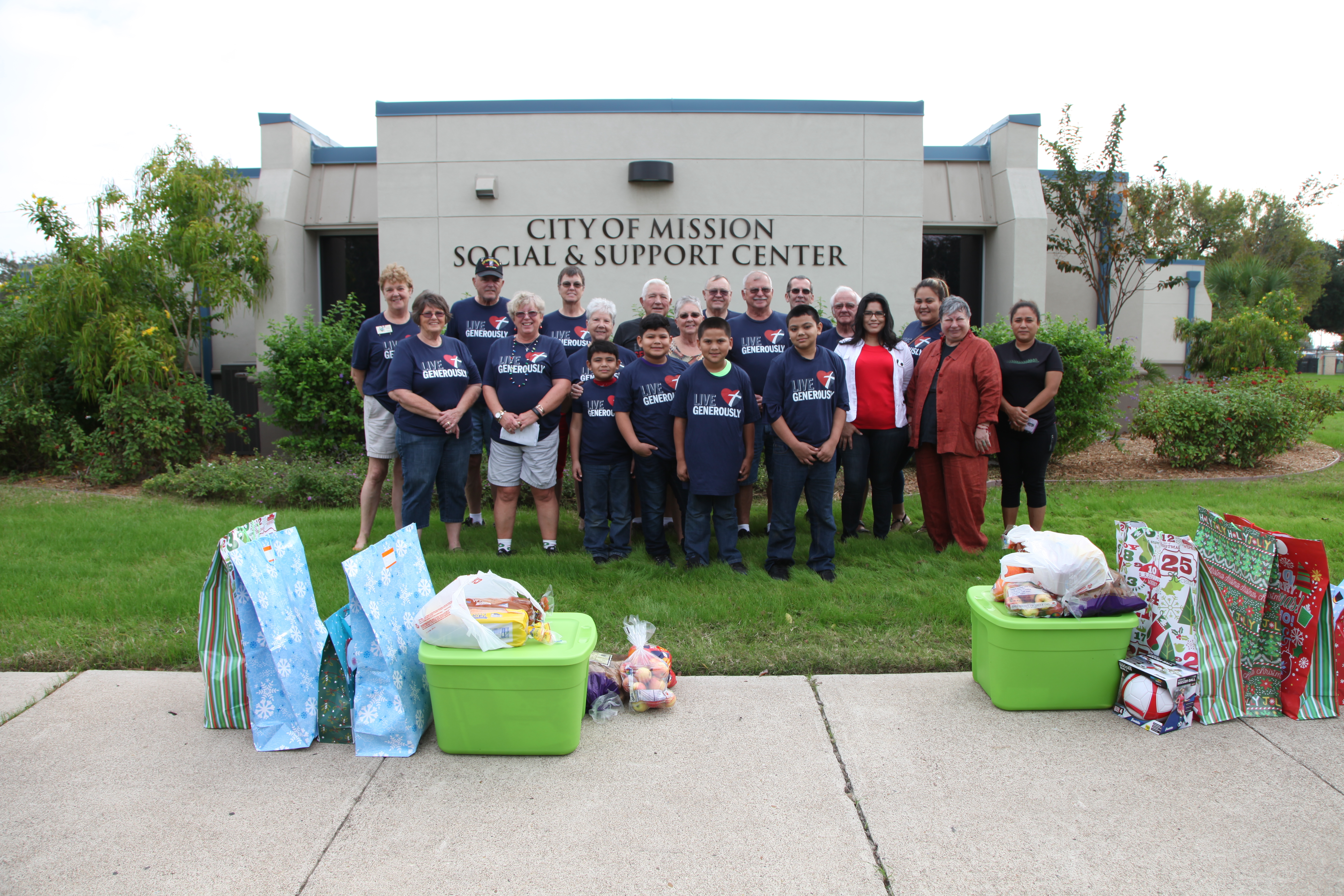
The new center provides not only food and other daily supplies for the needy, but also services, like help with utility bills, veterans services, and other activities. Along with the move and expanded location, the service center extended its hours to be open five days/week.
The Food and Service Center has also been of good use during specific times of need, like during the federal government shutdown, when many families of federal employees were able to take advantage of the center’s services. One of the new features of the center is a “Blessing Box,” a container accessible from the outside in which people can leave donation items any time of day. The Blessing Box has been so successful that it’s being replicated in other parts of the city.
Cities Can Lead the Way
As the nation continues to debate the future of healthcare, it is important that cities take a proactive role in addressing health-related problems, including health disparities that are too often determined by income, race, location, and other factors outside of one’s control. Inclusive civic engagement at the local level can ensure that initiatives to promote health do not just include the residents that most need services or intervention, but that those residents are at the table in forming the policies that most affect them.
The 2019 All-America Cities show us that cities can improve health outcomes by a stronger focus on mental and behavioral health, increasing access to healthy foods, improving the built environment, making healthy living fun and engaging, and establishing creative partnerships. They also show us that, while it may be easy to argue about healthcare in the abstract, it is much more difficult to retreat into our ideological bunkers once we recognize those issues in the faces of our neighbors, co-workers, classmates, and friends.
The programs and practices shared by all of the All-America Cities demonstrate the leadership and capacity of cities to collectively problem-solve, both via inter-agency or cross-sector collaboration, and through community-based leadership. They also show us that cities can—and should—continue to lead the way toward a healthier, and more equitable, future.
Lindsay M. Miller is a Senior Fellow at the National Civic League.
Rebecca Trout is the Program Director of the All-America City Award Program at the National Civic League.



